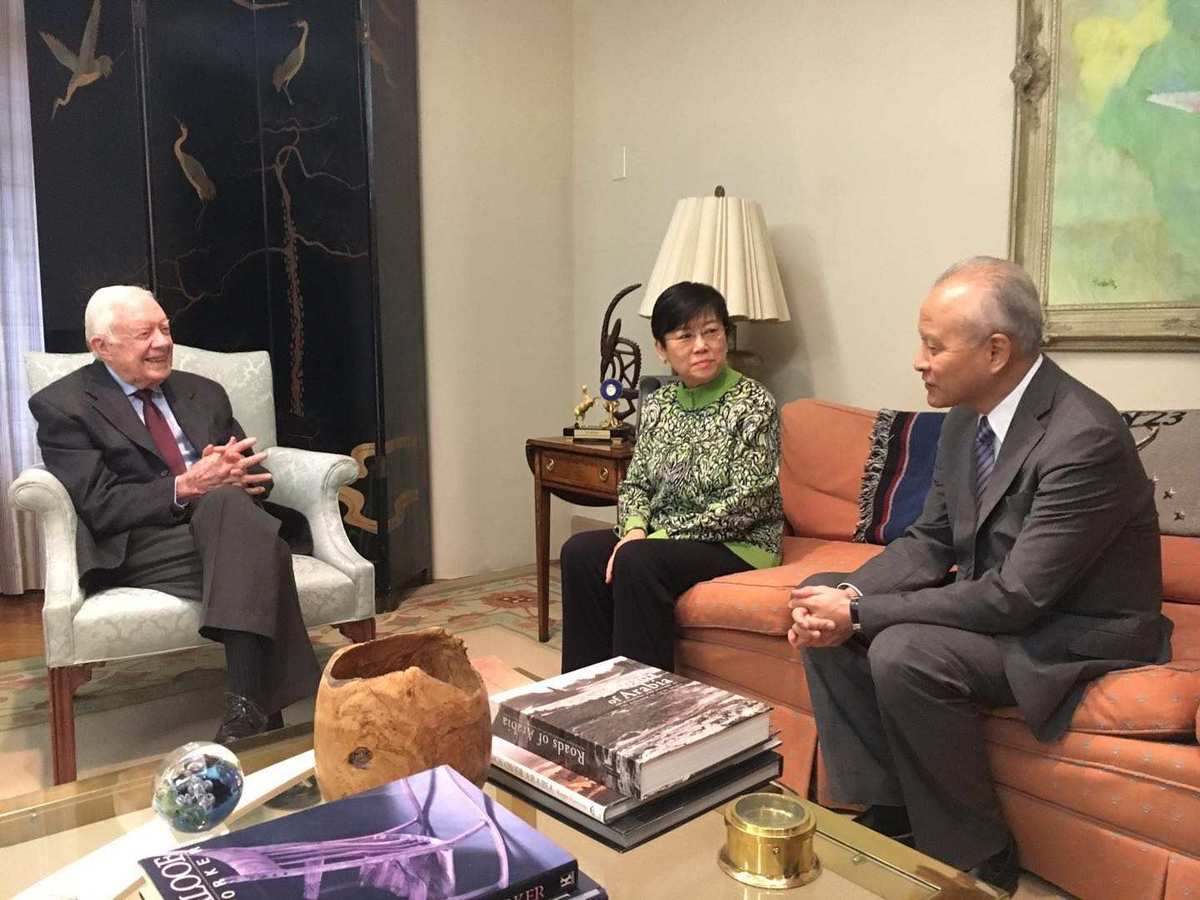Carter, Cui urge improvements in bilateral relationship
By MAY ZHOU in Atlanta | China Daily USA | Updated: 2019-01-19 06:13

Former US president Jimmy Carter and Chinese Ambassador Cui Tiankai called for a harmonious relationship between the two countries for the greater good of the international community, and Carter called US-China ties "the most important bilateral relationship in the world today''.
Carter, speaking on Thursday in Atlanta at the Ruby Gala celebrating 40 years of US-China relations, told the audience that the relationship between the two countries is "too important to be destroyed or set back by hatred or misunderstanding between the two countries''.
The gala was hosted by National Association of Chinese Americans with more than 300 people from China and US attending.
The two countries normalized diplomatic relations on Jan 1, 1979, following an agreement that Carter and Chinese Vice-Premier Deng Xiaoping announced on Dec 15, 1978. The remarks by Carter and Cui were part of a three-day symposium at the Carter Center marking the anniversary.
There were a lot of reasons to establish diplomatic relations after 30 years of animosity and misunderstanding, Carter said. One of the things that he said Deng and he talked about when they met in Washington was that Asian countries had been so deeply involved in war, it was a place of warfare, and 60 million people were killed during World War II.
"Since 1979 Asia has known nothing but peace, I think a large part of that was because the good relationship and mutual trust between the people of China and the people of the United States,'' Carter said. "The most important bilateral relationship in the world today is the one between the United States and China. We have some difficulties, and I have to say that the difficulties Deng Xiaoping and I faced were much greater than the trade disputes and so forth that exist today. but we have goodwill on both sides."
Carter expressed his hope and expectation that people in both countries will overcome current difficulties:
"I urge everyone of you, no matter how many people you know on Earth, in your own country, in the diplomatic circles, in business circles, in education circles, to put in the forefront of your mind and conversations the advantages that have already been reached and can be reached in the future between the United States and China in a state of harmony with mutual respect with friendship, and I would say even with love, between the people of China and people of my countries the United States of America."
Carter's sentiment was met with great applause from the audience.
Cui, speaking at the symposium on Friday, pointed out that while commemorating the 40th anniversary, "we cannot but notice some irrational doubts and myths about our relations''.
He went on to debunk myths such as claims that the US policy toward China in the last 40 years has failed as China hasn't copied the American model in its political and economic systems; that China has been taking advantage of the US while America's GDP soared from $2.63 trillion 40 years ago to $19.36 trillion in 2017, compared to China's same year GDP of $12.2 trillion.
"It means that the US economy has grown over the years by a greater increment than the total annual GDP of China. There is no evidence that the US is on the losing side in its relations with China; what we have is nothing but a win-win scenario," Cui said.
Cui pointed out that the entire Asian region and the world have benefited enormously from the ties – stability in Asia-Pacific and the overcome of the 2008 international financial crisis, for example.
The world is undergoing tremendous changes, and it has never been so important for China and the US to work together, Cui said.
"Yet there is still pressing need for better mutual understanding between us, especially with regard to strategic intentions. And the consequences of miscalculations resulting from misunderstanding and misinterpretation could be much more serious than ever before," Cui emphasized.
Cui urged promoting cooperation between the two countries to expand common interests and avoid vicious rivalry.
"The best solution to problems is through even closer cooperation rather than disengagement or the so-called 'decoupling'", he said.
Cui called for respecting each other's independent choice of a social system and developing path and accommodating each other's core interests and concerns.
"Among those, the Taiwan issue is the most important and sensitive issue for China-US relations. The one-China policy and the basic principles of the three China-US joint communiqués remain the political foundation for the bilateral relations," he said.
Addressing about 200 American and Chinese experts and former diplomats, Cui said that stability requires steadiness in handling of this comprehensive and complex relationship.
"We should never lose sight of the greater good of world peace and prosperity as our goals. We should always bear in mind the long-term interests of our two peoples. We should guard against the interference of narrowly-defined 'political correctness'. No noble cause is ever served by inciting and spreading hatred. No great power's foreign policy should be driven by fear and suspicion. Indeed, history has proven that no such attempt could succeed in the long-run," Cui cautioned.
























